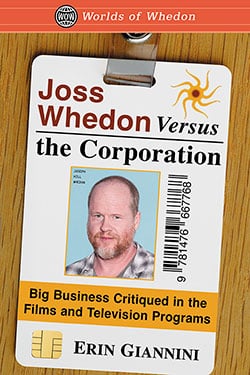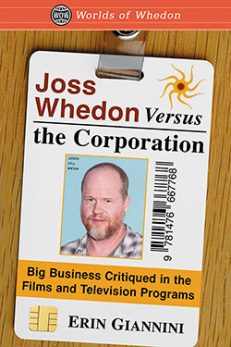Joss Whedon Versus the Corporation
Big Business Critiqued in the Films and Television Programs
Original price was: $29.95.$14.99Current price is: $14.99.
In stock
About the Book
Screenwriter, director, producer and comic book author Joss Whedon is best known for his television series and films featuring villainous vampires, angry gods and even bloggers who wish to rule the world. Within these works is a prevalent yet commonly overlooked theme—the corporate antagonist.
This book examines the effects of this corporate culture on the protagonists of Whedon’s most famous works (including Buffy, Roseanne, the Avengers, Agents of S.H.I.E.L.D. and Dollhouse) to reveal explicit sociopolitical commentaries on corporate control in the real world.
About the Author(s)
Bibliographic Details
Erin Giannini
Series Editor Sherry Ginn
Format: softcover (6 x 9)
Pages: 223
Bibliographic Info: notes, bibliography, filmography, index
Copyright Date: 2017
pISBN: 978-1-4766-6776-8
eISBN: 978-1-4766-3109-7
Imprint: McFarland
Series: Worlds of Whedon
Table of Contents
Preface 1
Introduction. The Scariest Monsters of All: Corporate Culture in the Works of Joss Whedon 5
Part I. Antagonists, Complicity and Insidious Movements: An Overview of Corporate Culture in the Works of Joss Whedon
One. “Evil white folks really do have a mecca”: The Corporate Antagonist in Angel and Firefly 22
Two. A Stranger Comes to a (Small) Town: Buffy, Roseanne and the Long Reach of Corporate Culture 45
Three. Who Owns the Show? The Avengers, Agents of S.H.I.E.L.D. and Marvel vs. Mutant Enemy 61
Four. In the Belly of the Beast: Dollhouse, The Cabin in the Woods and Dr. Horrible’s Sing-Along Blog 80
Part II. Subverting Tropes, Corporations and Media: A Dollhouse Case Study
Five. “That is their business, but that is not their purpose”: Dollhouse as a Subversive Text 96
Six. Curiosity or Arrogance? Dollhouse and the Troubled Relationship with Corporate-Sponsored Technology 110
Seven. “We’re pimps and killers, but in a philanthropic way”: Interrogating Corporate and Governmental Politics 127
Eight. “Call us what you want, just not family”: Undermining Whedon Tropes in the Dollhouse 157
Conclusion. Whedon as Corporate Critique, or Can TV Change the World? 176
Chapter Notes 183
Bibliography 187
Television and Filmography 200
Index 209





